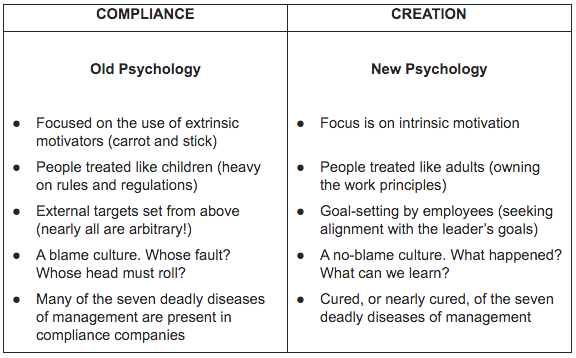More on Psychology
Episode #4 of the course “Creating creation companies” by Barry Mapp
Psychology has always been important in business. Today we are looking at what we mean by the terms “old psychology” and “new psychology.” Psychology underpins the workings of both the old and new style of company paradigms.
The psychology of compliance companies is described as old psychology. Here, the expected human behavior in work situations is extrapolated from research studies that were carried out either on starving animals or unhappy human beings.
The psychology of the creation company is described as new psychology. Expected human behavior is extrapolated from studies of animals that were happy and cared for, or research that was based on the study of human beings living happy and fulfilled lives.
Most psychology in textbooks is still biased toward old psychology. Also, unfortunately, most business advisory groups (Business Link was a past example in the UK) and business schools still promote business strategy based on old psychology principles; their own organizational structures and processes remain rooted in old psychology. Most government strategy is also based on the old psychology paradigm, and many business consultants (including those who profess to be thinking outside the box) still use old psychology techniques and theories.
The table below shows some of the fundamental differences between new and old psychological approaches. (Again, if you are not sure of the differences mentioned here, do some quick research of your own on the Internet.)
For example, do you know the differences between intrinsic and extrinsic motivators? Are you aware of the research that shows that overuse of extrinsic motivators sabotages employee intrinsic motivation? If we strive for self-motivated individuals in our business, then by definition, this motivation should be intrinsic.
Recommended book
“The Essential Deming: Leadership Principles from the Father of Quality” by W. Edwards Deming
Share with friends


